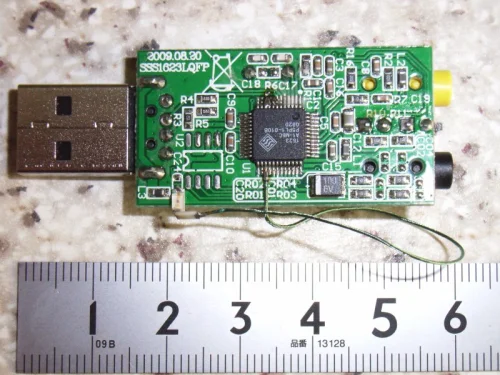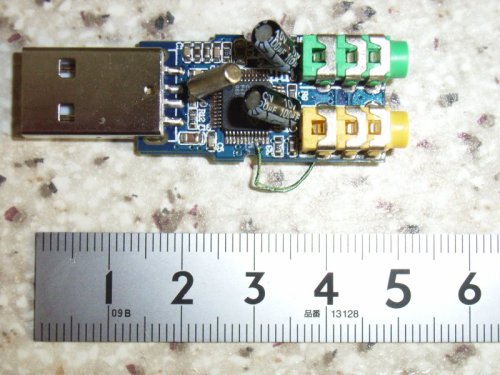CM108 compatible chips with GPIO
Most of my work on this project has been verifying that the CM108 compatible chips from 3S work as expected. So far I have confirmed that SSS1621 and SSS1623 have two GPIO lines available, and they can be controlled by the same command sequences which are published in the CM108 documentation.
The SSS1621 chip has two GPIO pins available (see page 2 of the datasheet), GPIO0 (pin 21) and GPIO1 (pin 22). These map to bits 0 and 1 of the GPIO byte. This is a very useful chip as it supports stereo input and possibly line-level signals. So far I have tried cutting the PCB track next to MICNU (pin 20) but the device still reports only one microphone. Maybe there is no internal pull-up, or maybe I didn’t cut the trace properly. The SSS1623 supports two GPIO pins too (see page 9 of the datasheet). It is only capable of mono, mic-level input. GPIO0 is pin 27, and GPIO1 is pin 28. Volume up/down pins are present on both chips. These chips should work for the various USB radio projects on the net (e.g. app_rpt and The Link Box) and I have managed to get Thomas Sailer’s soundmodem working too (see previous post). Obviously if you have an epoxy-blob package you cannot access the GPIO pins. Here are the vendor IDs and product IDs I have seen so far: 0c76:1605SSS1621 0c76:1607
SSS1623
0c76:160b
SSS1623 I have also included two pictures of the inside of each USB device, to show the chip and layout. I think the SSS1621 could allow the construction of a repeater with a single device: Channel 1:
Audio out
Speaker L
Audio in
Mic L
PTT
GPIO0
COS
Vol Up
Channel 2:Audio out
Speaker R
Audio in
Mic R
PTT
GPIO1
COS
Vol Dn


Leave a comment